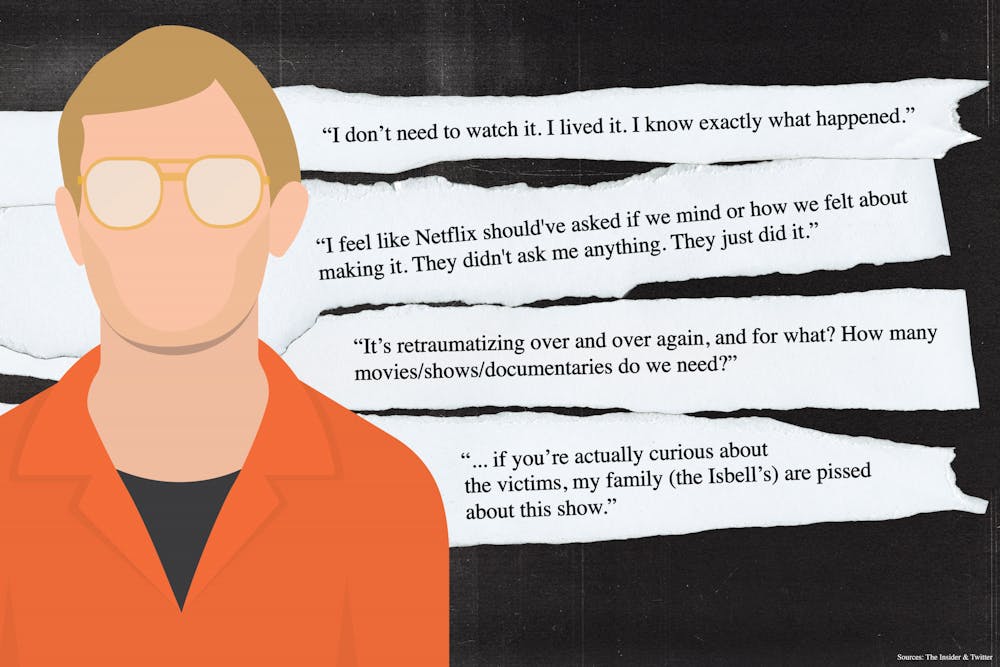The media needs to limit or end the creation of projects about serial killers that appeal to the true crime audience. Sensationalizing convicted killers can re-traumatize the victims' families by reminding them of their loved ones' gruesome deaths.
Jeffery Dahmer killed 17 people between 1979 and 1991. Fifteen of them were people of color or were part of the LGBTQIA+ community. The story of his life and the horrific killings has been told in a variety of different forms of media since 1992.

Wikipedia lists 30 projects about the serial killer including five films based on him listed on IMDb. These constant releases about Dahmer have seen no end with the addition of Netflix’s Dahmer – Monster: The Jeffrey Dahmer Story.
The first week of its release, the show reached the number one spot in Netflix’s top 10 and continued to be in the top 10 for three weeks. In the third place spot was Conversations With a Killer: The Jeffrey Dahmer Tapes, the third docuseries in a three-part documentary that also includes a series about serial killers Ted Bundy and John Wayne Gacy. Although audiences seemed to have a mostly positive response to each of the series, the same cannot be said for the families of the victims of these killers.
Eric Perry, the cousin of one of Dahmer’s victims, Errol Lindsey, criticized the series on Twitter, writing that his family was angry about the show.
“I believe that it’s not right for the victims’ families to relive their trauma for the sake of the public’s entertainment,” Joshua Brabham, a first-year media arts student who watched the Dahmer show, said.
In addition to condemning the series, Rita Isbell, the sister of victim Lindsey went on to call out Netflix for not notifying the victims’ families before production.
Perry also said his family found out when everyone else did. However, Ryan Murphey, the director of Dahmer, said the team had reached out to about 20 of the victims' families and friends and received no response.
As the series gained popularity, Dahmer-inspired costumes were on sale on eBay. This was triggering for Shirley Hughes, the mother of victim Tony Hughes who expressed to TMZ her disappointment that Netflix and online stores could profit from her son’s death. Listings for the Dahmer Halloween costumes were then removed from the platform due to violating the site's "Violence and Violent Criminal Policy."
Following the release of Dahmer, a trend began on TikTok and Twitter with users posting about feeling sorry for the serial killer and others "thirsting" for him. It doesn’t help that Hollywood’s fetishization of serial killers continues to birth a new wave of social media users who lust after murderers such as Ted Bundy and Richard Ramirez. Both of whom have had multiple projects made about them, the most recent being in 2021.
The entertainment industry has proven it has a habit of making a spectacle of not only murderers but the victims, too.
The disappearance and death of Gabby Petito spread like wildfire across the country in 2021 with news stories still coming out about the case. On Oct. 1, Lifetime premiered The Gabby Petito Story, and a one-hour documentary about her airing after. Hulu also premiered Missing — a docuseries about telling the untold stories of people who disappeared. According to the trailer, the case of Petito will be featured in the series.
“When you turn on Hulu, and your daughter’s story is the recommended show to watch. It’s still shocking, feels like I’m outside looking in, this cannot be our life,” Nicole Schmidt, Petito's mother said in a Tweet.
True crime has blown up in recent years with the popularity of podcasts like Crime Junkie. People seem to want insight into morbid murders and the minds that committed them. But the entertainment industry takes advantage of these curiosities and tries to humanize the killer which often creates undeserved empathy for the criminal.
“In the past, there’s a lot of songs, there’s art, there are jokes about Jefferey Dahmer. And so the show tops everything," Angelica Ho-Olinger, a second-year psychology student, said. "And kind of brings Jefferey Dahmer into a greater person which is not supposed to happen."
It seems there will be no shortage of serial killer series to come as Netflix announced two new seasons of the Dahmer show as an anthology series. Stories of two more murderers will be added to the Monster series.
While some may argue that it’s important for these stories to be told, the way it’s being done comes off as exploitative.
“I think (the series) is dramatizing murder and these brutal murders of gay men that happened," Blake Gunnels, a first-year psychology student, said. “People are sexualizing Jeffrey Dahmer now which is a huge problem, and it’s probably definitely traumatizing for the families.”
There should be evidence of consent from the families before these types of projects are released. If studios decide not to ask families, there should at least be a limit to releases related to serial killers.
The releases must make you wonder how many times these families must have to see their loved ones' deaths recommended to them on television before the line is crossed. At this point, the line seems to be nonexistent. The victims deserve whatever sliver of privacy they have left because there are enough serial killer stories to last everyone a lifetime.

